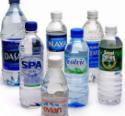
Home Water Treatment
Bottled Water
 First off, let me mention that bottled water does not mean cleaner or safer water, but it definitely does mean more expensive and wasteful water. If you are buying bottled water because you are concerned about your tap water, there's a good chance you are flushing your money down the drain. About 90% of the cost of bottled water is the bottle, lid, and label - the water is nearly free. And, the amount of plastic waste generated from all those individual water bottles is staggering.
First off, let me mention that bottled water does not mean cleaner or safer water, but it definitely does mean more expensive and wasteful water. If you are buying bottled water because you are concerned about your tap water, there's a good chance you are flushing your money down the drain. About 90% of the cost of bottled water is the bottle, lid, and label - the water is nearly free. And, the amount of plastic waste generated from all those individual water bottles is staggering.
The EPA (Envionmental Protection Agency) found in studies that bottled water is not necessarily safer than tap water. The EPA enforces cleanliness standards for public water systems, but it is the FDA (Food and Drug Administration) that regulates bottled water. That's right, bottled water is considered a food product rather than drinking water. Weird!
Does it matter whether EPA or FDA regulate bottled water standards? Well, the EPA has strict standards regarding e-coli, giardia, and cryptosporidium in tap water, but the FDA does not require bottled water to meet the same standards.
Instead of buying bottled water, whether its individual sizes or large delivered bottles, check into a home filtration system. A filtration system will save you money, give you good clean water, and conserve the resources wasted on all those bottles.
Home Filter Systems
A simple home water filter is a great alternative to bottled water for making your tap water better tasting and clean. See water filters page for information about types of water filters or water filter products page for reviews of some products.
BRITA makes excellent water filter systems that remove contaminants often found in tap water. They have pitchers that filter your water or devices you attach right to your faucet. The faucet device can be turned on or off with a switch so you only filter the water you want, such as a glass of drinking water. The price is around 30 cents/gallon.
PUR also manufactures great faucet-mount filters, pitchers, coolers, and dispensers for a similar price and function as BRITA.
These filters will remove protozoa contaminants but not viruses and not all bacteria. A water purifier is needed to take care of those scoundrels.
Reduce Water Use and Pollution
By reducing the amount of water consumed in your home, you are reducing the amount of waste and pollution. Here are some tips to follow that will help us all.
In your home:
- Properly dispose of household hazardous waste, like paints, oil, solvents - don't pour down the sink or storm drain.
- Purchase non-toxic alternative products whenever possible.
- Recycle everything you can.
- Install low-flow showerheads and toilets.
- Repair all dripping faucets or leaks.
- Completely fill dishwasher or clothes washer.
- Take short showers instead of baths.
In your yard:
- Water very early in the morning to reduce evaporation.
- Water only as much as is needed by your lawn type.
- Use a slow-watering system such as a soaker hose instead of sprinkling.
- Plant native species for your area - they live better and require less maintenance.
- Use natural fertilizers and pesticides.
- Compost - recycle all your yard waste and a large part of your family's food waste.
- Collect rainwater from your roof and use it for watering your lawn.
- Minimize asphalt and cement by maximizing vegetation on your property.
- Plant shade trees on the south side of your home to keep it cool.
Your other activities:
- Install a spraygun on your hose so it turns off when you are not spraying instead of letting it run.
- Wash your car with biodegradable soap on your lawn instead of the driveway.
- Take your car to a carwash that recycles its water.
- Pick up pet waste immediately and dispose in the garbage.
- Plan ahead to combine errands into one trip to reduce miles you drive.

